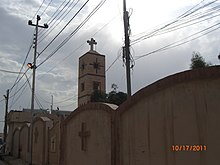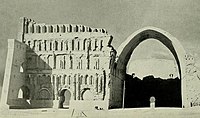Chaldean Catholic Eparchy of Amadiyah and Zaku
Eparchy of Amadiyah and Zakho | |
|---|---|
 St. George Cathedral in Zakho | |
| Location | |
| Country | Iraq |
| Metropolitan | Patriarchate of Baghdad |
| Statistics | |
| Population - Total | (as of 2013) 3,500 |
| Information | |
| Denomination | Chaldean Catholic |
| Rite | East Syriac Rite |
| Established | June 10, 2013 (Merger of the Diocese of Amadiyah and the Diocese of Zakho) |
| Current leadership | |
| Pope | Francis |
| Bishop | Mgr Rabban al Qas |
Chaldean Catholic Diocese of Zakho is a diocese of the Chaldean Church in the second half of the 19th century and for most of the 20th century. The diocese of Zakho was merged with the Chaldean diocese of [[Amadiya (Chaldean Diocese)|[ʿ] Error: {{Transliteration}}: transliteration text not Latin script (pos 1) (help)Amadiya]] in 1987.[1] In December 2001, a new bishop was consecrated. In July 2013, Zakho was suppressed to the Diocese of Amadiyah.
Background
The diocese of Zakho was founded in 1851. The diocese included some villages in the western Khabur valley and the mountains to the northeast of Zakho previously in the diocese of Gazarta, and several villages in the Dohuk district previously in the diocese of [[Amadiya (Chaldean Diocese)|[ʿ] Error: {{Transliteration}}: transliteration text not Latin script (pos 1) (help)Amadiya]].[2]
The Chaldean bishops of Zakho
The first Chaldean bishop of Zakho was Emmanuel Asmar (1859–75).
He was succeeded by Quriaqos Giwargis Goga, a monk of the monastery of Rabban Hormizd, who was born in Telkepe on 15 January 1820 and ordained a priest in 1855. According to Tfinkdji he was consecrated for Zakho on 25 July 1875 by the patriarch Joseph VI Audo, but a manuscript note gives the date of his consecration as 1 August 1875.[3] In 1876 Quriaqos Giwargis Goga rebelled against the patriarch and installed himself in the village of Telkepe in the patriarchal diocese of Mosul, where he was supported by most of the village's priests. Following an appeal to the Vatican by Joseph Audo, the two rebels eventually submitted, and Goga was transferred to the diocese of [[Amadiya (Chaldean Diocese)|[ʿ] Error: {{Transliteration}}: transliteration text not Latin script (pos 1) (help)Amadiya]] in 1879.
Quriaqos Goga was succeeded by Mattai Paul Shamina (1879–85) and Stephen Yohannan Qaynaya (1886–9).
Jeremy Timothy Maqdassi, who was born in Alqosh in 1847 and became a priest in 1879, was consecrated bishop of Zakho either in 1890 (De Clerq) or 1892 (Fiey), and remained its bishop until his death in 1929. He was succeeded by Peter Raffo [ʿ] Error: {{Transliteration}}: transliteration text not Latin script (pos 1) (help)Aziz (1929–37), Yohannan Nisan (1937–57), Thomas Rayyis (1957–66) and Gabriel Qoda (27 November 1965– 7 March 1968).
Gabriel Qoda, who died in March 1993, was succeeded as bishop of Zakho on 7 March 1968 by Joseph Babana. Joseph Babana died on 9 September 1973 at the age of 57, and was succeeded on 13 October 1973 by Yohannan Paulus Marcus.
The elderly Yohannan Paulus Marcus, who died on 13 July 1985 at the age of 75, was succeeded as bishop of Zakho by Stephen Kajo on 29 November 1983.
Following the death of Stephen Kajo on 8 November 1987, the diocese of Zakho remained vacant for fourteen years. During this period the few remaining Chaldeans in the Zakho district remained under the care of Yohannan Qello, the bishop of [[Amadiya (Chaldean Diocese)|[ʿ] Error: {{Transliteration}}: transliteration text not Latin script (pos 1) (help)Amadiya]].
In December 2001 Petros Hanna Issa Al-Harboli was consecrated bishop of Zakho. After brief illness he died on November 3, 2010.
In July 2013, the Chaldean diocese of Amadiya was united with Zakho under Rabban al-Qas.
Population statistics
In 1867 the diocese of Zakho had a population of 3,000 Chaldeans and contained 15 villages (Martin).
In 1896 the diocese had a population of 3,500 Chaldeans, and contained 15 parishes and 20 churches (Chabot). The largest villages in the diocese were Zakho, Dohuk, Sharanesh, Yarda, Beidar, Bir Sivi, [[Mar Yaqob|Mar Ya[ʿ] Error: {{Transliteration}}: transliteration text not Latin script (pos 1) (help)qob]] and Esnakh, and the bishop resided either at Zakho or Dohuk. The diocese then had ten indigenous priests and 5 priests who had been trained at the monastery of Rabban Hormizd.
In 1913 the diocese contained 15 villages and 17 churches and had a population of 4,880 Chaldeans, served by 13 priests.
Chaldean communities in the diocese of Zakho, 1913
| Name of Village | Name in Syriac | Number of Believers | Number of Priests | Number of Churches | Name of Village | Name in Syriac | Number of Believers | Number of Priests | Number of Churches |
| Zakho | ܙܵܟ݂ܘܿ | 50 | 1 | 1 | Marga | 760 | 1 | 1 | |
| Beidar | 400 | 1 | 1 | Bellon | 300 | 1 | 1 | ||
| Berseve | ܒܝܪܣܦ̮ܐ | 400 | 1 | 1 | Esnakh | 600 | 1 | 1 | |
| Sharanesh | ܫܪܢܘܫ | 600 | 1 | 2 | Dohuk | ܒܝܬ ܢܘܗܕܪܐ | 350 | 2 | 1 |
| Alanesh | ܐܠܢܝܫ | 70 | 1 | 1 | Shiyos | 210 | 1 | 1 | |
| Yarda | 250 | 1 | 2 | Qashafir | 150 | 0 | 0 | ||
| Umra (Deir Shish) | ܥܘܡܪܐ | 200 | 0 | 1 | Garmawa | 40 | 0 | 1 | |
| Baijo | 500 | 1 | 2 | Total | 4,880 | 13 | 17 |
A large number of Assyrian refugees settled in the Zakho district after the First World War, and their presence is reflected in later statistics for the diocese. In 1928, according to an official statistic prepared by the Congregation for the Oriental Churches, the diocese of Zakho included 16 villages and contained 8,000 Chaldeans and 18 churches. In 1937 the diocese included 23 villages, and contained 10,852 Chaldeans, 18 priests, and 16 churches (Kajo).
Notes
References
- Baaba, Youel A. (2009). The Assyrian Homeland before World War I. Alamo, California. ISBN 978-0-9707489-6-6.
{{cite book}}: CS1 maint: location missing publisher (link) - Badger, George Percy (1852). The Nestorians and Their Rituals. Vol. 1. London: Joseph Masters.
- Badger, George Percy (1852). The Nestorians and Their Rituals. Vol. 2. London: Joseph Masters. ISBN 9780790544823.
- Chabot, Jean-Baptiste (1896). "Éttat religieux des diocèses formant le patriarcat chaldéen de Babylone". Revue de l'Orient chrétien. 1: 433-453.
- Fiey, J.M. (1962). Assyrie chrétienne (3 vols). Beirut.
{{cite book}}: CS1 maint: location missing publisher (link) - Fiey, Jean Maurice (1993). Pour un Oriens Christianus Novus: Répertoire des diocèses syriaques orientaux et occidentaux. Beirut: Orient-Institut. ISBN 9783515057189.
- Giamil, Samuel (1902). Genuinae relationes inter Sedem Apostolicam et Assyriorum orientalium seu Chaldaeorum ecclesiam. Roma: Ermanno Loescher.
- Martin, Jean Pierre Paulin (1867). La Chaldée, esquisse historique, suivie de quelques réflexions sur l'Orient. Rome.
{{cite book}}: CS1 maint: location missing publisher (link) - Tfinkdji, J. (1914). "L'église chaldéenne catholique autrefois et aujourd'hui". Annuaire Pontifical Catholique (17): 449–525.
- Tisserant, Eugène (1931). "Église nestorienne". Dictionnaire de théologie catholique. Vol. 11. pp. 157–323.
- Wilmshurst, David (2000). The Ecclesiastical Organisation of the Church of the East, 1318–1913. Louvain: Peeters Publishers. ISBN 9789042908765.


